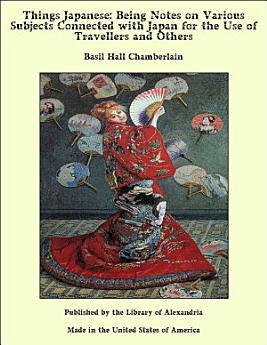Things Japanese: Being Notes on Various Subjects Connected with Japan for the Use of Travellers and Others
About this ebook
Thus does it come about that, having arrived in Japan in 1873, we ourselves feel well-nigh four hundred years old, and assume without more ado the two well-known privileges of old age,—garrulity and an authoritative air. We are perpetually being asked questions about Japan. Here then are the answers, put into the shape of a dictionary, not of words but of things,—or shall we rather say a guide-book, less to places than to subjects?—not an encyclopædia, mind you, not the vain attempt by one man to treat exhaustively of all things, but only sketches of many things. The old and the new will be found cheek by jowl. What will not be found is padding: for padding is unpardonable in any book on Japan, where the material is so plentiful that the chief difficulty is to know what to omit.
In order to enable the reader to supply deficiencies and to form his own opinions, if haply he should be of so unusual a turn of mind as to desire so to do, we have, at the end of almost every article, indicated the names of trustworthy works bearing on the subject treated in that article. For the rest, this book explains itself. Any reader who detects errors or omissions in it will render the author an invaluable service by writing to him to point them out. As a little encouragement in this direction, we will ourselves lead the way by presuming to give each reader, especially each globe-trotting reader, a small piece of advice. We take it for granted, of course, that there are no Japanese listening, and the advice is this:—Whatever you do, don't expatiate, in the presence of Japanese of the new school, on those old, quaint, and beautiful things Japanese which rouse your most genuine admiration. Antiquated persons do doubtless exist here and there to whom Buddhist piety is precious; others may still secretly cherish the swords bequeathed to them by their knightly forefathers; quite a little coterie has taken up with art; and there are those who practise the tea ceremonies, arrange flowers according to the traditional esthetic rules, and even perform the mediæval lyric dramas. But all this is merely a backwater. Speaking generally, the educated Japanese have done with their past. They want to be somebody else and something else than what they have been and still partly are.
When Sir Edwin Arnold came to Tōkyō, he was entertained at a banquet by a distinguished company including officials, journalists, and professors, in fact, representative modern Japanese of the best class. In returning thanks for this hospitality, Sir Edwin made a speech in which he landed Japan to the skies—and lauded it justly—as the nearest earthly approach to Paradise or to Lotus-land,—so fairy-like, said he, is its scenery, so exquisite its art, so much more lovely still that almost divine sweetness of disposition, that charm of demeanour, that politeness humble without servility and elaborate without affectation, which place Japan high above all other countries in nearly all those things that make life worth living. (We do not give his exact words, but we give the general drift.)—Now, do you think that the Japanese were satisfied with this meed of praise? Not a bit of it. Out comes an article next morning in the chief paper which had been represented at the banquet,—an article acknowledging, indeed, the truth of Sir Edwin's description, but pointing out that it conveyed, not praise, but pitiless condemnation. Art forsooth, scenery, sweetness of disposition! cries this editor. Why did not Sir Edwin praise us for huge industrial enterprises, for commercial talent, for wealth, political sagacity, powerful armaments? Of course it is because he could not honestly do so. He has gauged us at our true value, and tells us in effect that we are only pretty weaklings.






